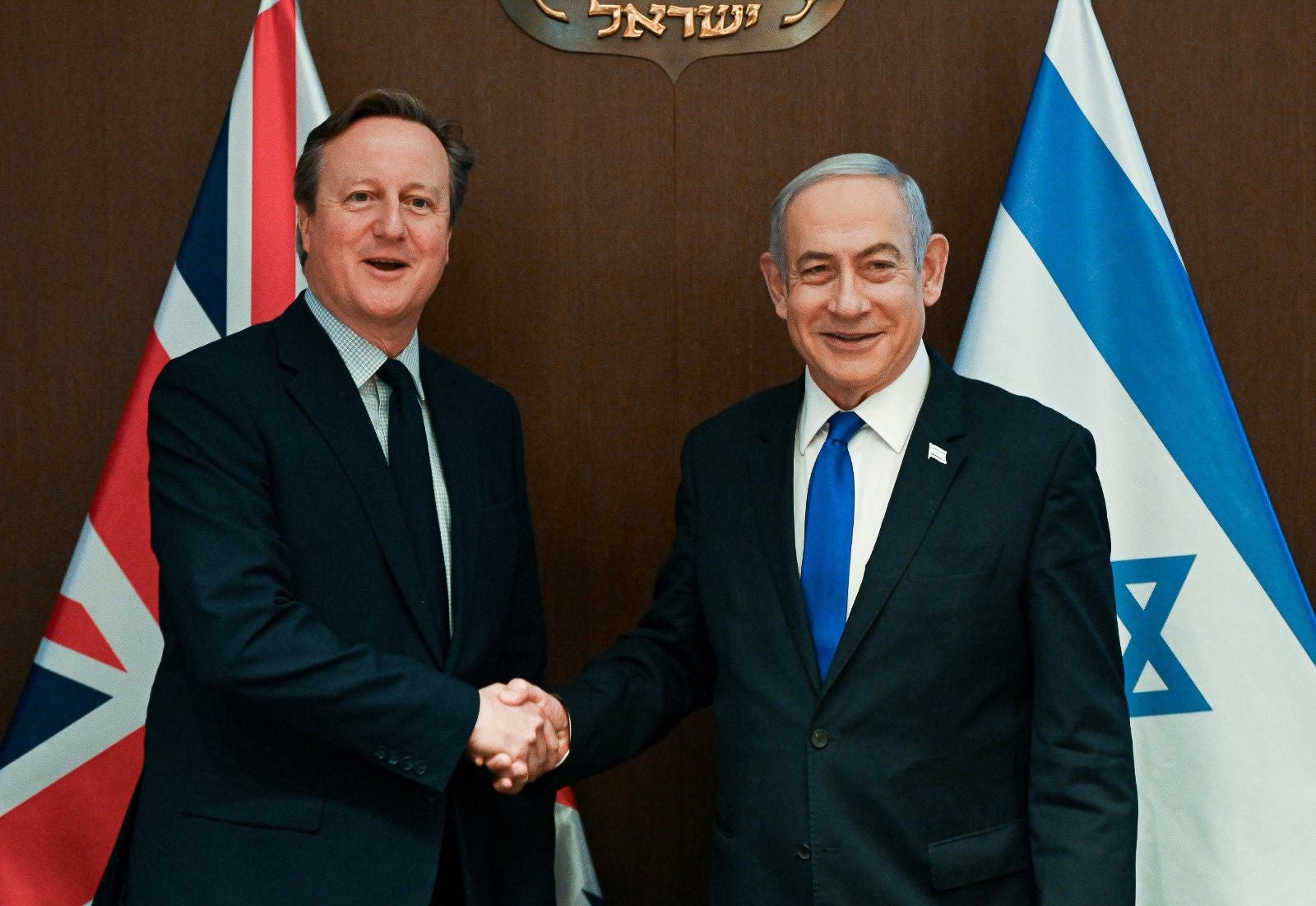David Cameron is proving he’s back not by political talent, but because of a lack of it
Letters to the editor: our readers share their views. Please send your letters to letters@independent.co.uk

With all the tragedy and death in both Gaza and Ukraine, the media is saturated by people calling for de-escalation, all of which falls on deaf ears.
And yet the worst offender is our own foreign secretary, David Cameron, elevated once again in political circles not by personal talent but by the paucity of it in today’s government. Trips to the US for meetings with people who refuse to see him or take his calls. Trips to Tel Aviv to be told “Thanks Dave, but we will make our own decisions”.
I can only imagine he is driven by hearing his own voice and seeing his own image regardless of content. Or is it a predilection for air travel? Remember his air commute between Newquay and London at the expense of Lex Greensill?
So David, please go back home. And please, media managers, give us less of this pointless content.
David Hill
Waterlooville
The patriot’s new clothes
It was interesting to read that Nigel Farage thinks that even Winston Churchill couldn’t lead the Conservatives to victory in the next election. He is of course right. Churchill was never particularly good at winning elections in his own era. He fought three general elections as Conservative leader, lost two of these (one to a landslide having just won the war) and when he did win enough seats to form a government, he lost the popular vote. So there is no reason to think he’d be good at winning elections in our time.
Churchill was appointed as prime minister because he was the most zealous anti-Nazi in the Conservative Party at a time when the opposition parties would only accept such a figure to lead the wartime coalition. A politician who was very worried about public opinion and good at winning populist votes would not have been qualified to push back against Germany in 1940.
The fact Churchill didn’t is what secures his place in history.
As ever, Farage wears the clothes of a patriot but doesn’t understand what makes this country, and its heroes, great.
Matt Kelcher
Brent
Rayner’s critics have sabotaged themselves
Zoe Grunewald reports that Angela Rayner is likely to argue that enhancements made to her former council house offset the tax she would have paid had it not been her primary property.
Labour’s deputy leader should have sat tight and not released any further information. Because the longer the story has rumbled on, the more her popularity has increased as more and more people take her side against her attackers – mostly male, wealthy, and members, or backers, of a party now widely associated with sleaze.
Roger Hinds
Surrey
Paying it back
The Independent’s recent article by Zoe Grunewald states that “married couples cannot legally have two primary residences for tax purposes”. And therefore presumably there will be calls for Angela Rayner to pay any tax saved as part of her previous tax returns.
Of course, we can therefore expect the wife of the prime minister, having claimed that her main residence for tax purposes was India, will be asked to pay back the tax she saved as a non-dom? Or is this another “them and us” scenario?
Geoff Forward
Stirling
The root of America’s dysfunction
As Joe Biden and Donald Trump are now officially set to square off – again – for the presidency, many Americans are asking the same question: why?
Why are these two men – both old and unpopular – the finalists for America’s most important and demanding job?
The answer is America’s two-party political system. While third parties occasionally make some noise, they never threaten the Democrat-Republican duopoly. Just as America’s founders feared.
In his farewell address to the country upon leaving the presidency, George Washington warned against having only two political parties: “The alternate domination of one faction over another, sharpened by the spirit of revenge, natural to party dissension ... is itself a frightful despotism.”
Indeed, the fewer tribes there are, the more extreme tribalism gets. And in America, the two political tribes battle each other – and only each other – every single day. This myopic rivalry amplifies bias, warps the marketplace of ideas, shunts policy platforms, stifles compromise and negotiation, and leads to subpar and underqualified government officials.
A more diverse set of political parties would invigorate mainstream political discourse with additional points of view, as today many important ideas aren’t championed by either side. The introduction of new ideas and coalitions would reduce rigid partisanship, calm bias and tribalism, and provide incentives for government officials to respect empirical reality and not just reflexively appease their constituencies.
Additional major political parties wouldn’t solve everything, to be sure. But a vibrant multi-party system would squarely address and materially reduce the biggest problems in US politics: tribal rivalry and irrational partisanship. A more diverse and rational political system would make elections more about individual merit and less about party loyalty. And this would likely lead to talented and energetic presidential candidates who are a good fit for the job – in stark contrast to what we have now.
Will Cooper
Address supplied






Join our commenting forum
Join thought-provoking conversations, follow other Independent readers and see their replies
Comments